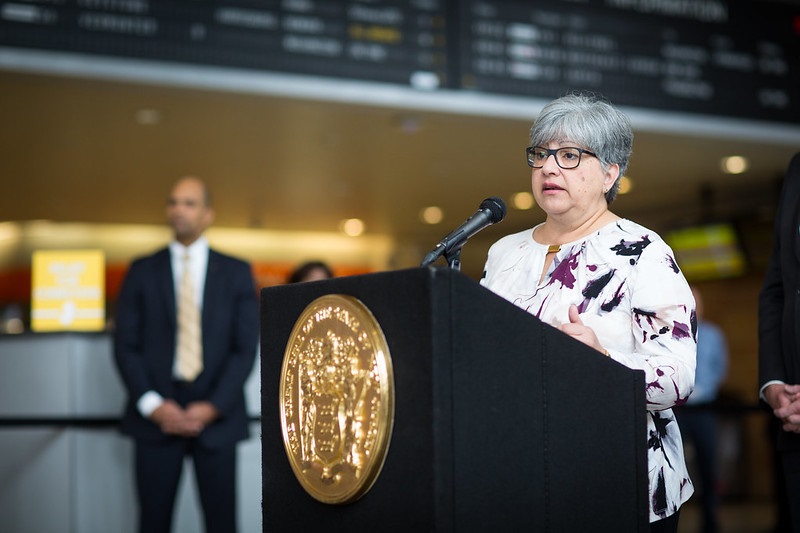Diane Gutierrez-Scaccetti, the commissioner of the state’s Department of Transportation, speaks during a 2018 press event. — Courtesy: Edwin J. Torres/Governor’s Office
By Joshua Burd
State officials are seeking to “provide a stronger response” to developers looking to build around NJ Transit’s rail and bus stations, hoping to jumpstart a plan to monetize the agency’s vast but underutilized real estate portfolio.
That was among several key messages last month by Diane Gutierrez-Scaccetti, the commissioner of the state’s Department of Transportation, during a program hosted by NAIOP New Jersey. As developers continue to show interest in parcels around NJ Transit facilities, she said the agency hopes to strengthen the role of its recently created real estate and economic development department.
“Transit is, at its core, a bus and rail operations agency, not a real estate agency,” Gutierrez-Scaccetti said. “So by developing that office, what we hoped was that we would be able to pivot … the attention of the agency to really managing its real estate assets more efficiently.
“I think we’re evolving, maybe not as fast as we would like, but looking at: How could we make that office more effective? Do we have all of the requisite talent we need in house to really move that development forward?”

The commissioner spoke Feb. 16 during a “screenside chat” with NAIOP New Jersey CEO Michael McGuinness, which came as part of the association’s Transportation & Capitol Hill Update Webinar. NJ Transit is now in the early stages of due diligence and negotiations with a prospective developer for 12 acres at the busy Metropark station in Woodbridge, where it solicited proposals in fall 2020, while Gutierrez-Scaccetti noted that the agency is now fielding interest at other transit hubs in the state.
Such is the work of the real estate and economic development office, which was created under a state law signed by Gov. Phil Murphy in late 2018. As it currently stands, Gutierrez-Scaccetti said transit-oriented development projects are essentially folded into NJ Transit’s general procurement process, but she intimated that could soon change.
“We are going to look at whether our process for procuring transit-oriented development is really the most efficient,” she said. “None of these things should take years. They should move much more quickly than perhaps they’re moving today.”
She added that Kevin Corbett, NJ Transit’s executive director, will spearhead that effort and report back through the agency’s board and the governor’s authorities unit “on what they found for improvements that they can continue to make for that particular office.”
As for other specific projects, Gutierrez-Scaccetti said NJ Transit is weighing options for the iconic Hoboken Terminal, which “needs tremendous structural improvement, but I think it has strong commercial asset possibilities as a terminal.” There is also potential for “additional commercial space, but we are looking at the best way to do that in the context of other projects going on around it.”
She and McGuinness also referenced the agency’s Somerville station, where redevelopment is well underway.
“The last time I was in Somerville, they looked like they were in full swing on their TOD around the station,” Gutierrez-Scaccetti said. “It is really phenomenal work that has occurred in Somerville.”
NJ Transit seeking proposals from four finalists in 12-acre Metropark redevelopment










